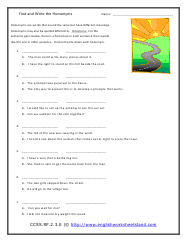Homonyms Worksheets
Related ELA Standard: RF.2.3.E

There goes that English language again. There are ton of words that have multiple meanings and the reader is often left to determine the context of the situation to be able to understand the meaning of the word. When you put the prefix and suffix of this word together, you will see it is an easy word to remember. The prefix "homo-" means one or the same. The suffix "-nym" means name. Putting all these things together, homonyms are words that are the same name. They are words that a spelled the same or pronounced in the same manner, but they have completely different meanings. If you think about it, the English language is completely littered with these types of words. No wonder why non-native speakers find it such a difficult language to master. These worksheets will have students compare and learn about new homonyms.
Homonym Worksheets To Print:
Affect vs. Effect -
The timeless classic that has been confusing people for years. We show you that you need to determine how the word is used grammatically to choose the correct homonym.
What Are They? - We give you a sentence and a general understanding, you do the rest. After reading the
meanings of the homonyms for each sentences, underline the associated
term in the sentence
Find and Write Them
- They kind of sound a lot alike, don't they? You will need to create words for this worksheet.
Fish them Out - Fishing
is just the task for you in this worksheet. You will identify the terms that serve this purpose of the course of multiple sentences.
Write Sentences with Homonyms
- Form your own sentences with little to no prompting. You will be given a series of words that you will need to use and you will need to brainstorm an alternate use for the word.
Same Sounds Flying
- For the following pairs of sentences, write the two associated
homonyms for each of the sentences.
Which One? - Determine
the homonyms that go with the following words.
Where Is It? - Complete
the sentences below using these 5 homonym pairs. A nicely packed together series of work for you.
Underline Them
- In the passage, identify and underline at least 6 different pairs
of homonyms.
Id Them - After reading
the meaning, underline the associated homonym in the sentence.
Bank On It - In these
2 sentences, the homonym must represent a different meaning of the
word.
Farming For The Same Sound
- Homonyms are words that sound the same but have different meanings.
Homonyms may also be spelled differently.
Different Spellings
- Use this as a clue to determine the matching homonym with a different
spelling that should fill in the blank space.
Pronunciation -
How do you say them? Choose the meaning of the word used in each sentence.
Choose The Meaning
- You only have to decide between 2 choices. Use the multi-colors to help you wrangle this one.
Lock it Down -
More reps for your brain to toy with. A very similar approach is used here.
Choose It - We
saved the more difficult words for last.
Ridiculously Common Homonyms
Words often have multiple meanings based on how they are used within a sentence. While homonyms are often confused, there are a few that we come in contact with more than others. Obviously this is relative to your daily routine, which you interact with regularly, and your geography. Let's take a look at some of the most commonly confused words.
The word "air" that is synonymous with the element oxygen, in that context, is only composed of twenty-percent oxygen. It is mostly (two-thirds) nitrogen gas. In that context "air" is used as a noun, but it can also mean an impression left based on ones mannerisms. An example sentence would be, "He spoke with a mildly air of terror." When used as a verb, "air" becomes a way to publicly express your opinion, usually in a negative manner.
What do you think of when you hear the word "fair"? I think of a flea market like environment or an amusement park. Other people, especially any in the law and order sector, think of an equitable or equal judgment being passed. In generations past, "fair" was a word focus on beauty. Just ask Snow White?
As we can see from just two words, we need to really take the time to take in the context of the situation when we come across homonyms. Many written responses are fumbled mostly by ignoring the context that words are found in.
The most commonly misused homonym pair that I find are the words affect and effect. We explored this right away in the worksheets above. It all comes down to how the word acts with the sentence that it is loaded into. If it acts as a noun, effect is used. If it is a verb, affect is used. The only time this does not hold up is when you are describing an emotional or psychological state, so just be aware of that. RAVEN is a simple acronym that can remind you how to use the correct one every time. RAVEN stands for:
R = Remember
A = Affect is
V = a Verb
E = Effect is
N = a Noun
What Types of Work Do You Find Them Used In?
You will find that homonyms have made a living at being present in lyrical works that are often performed such as in music, poems, and plays. They make for a nice way to demonstrate the issues with the English language in general. Some things in this language just do not make a whole lot of sense, those art forms can often be used to demonstrate that well.

